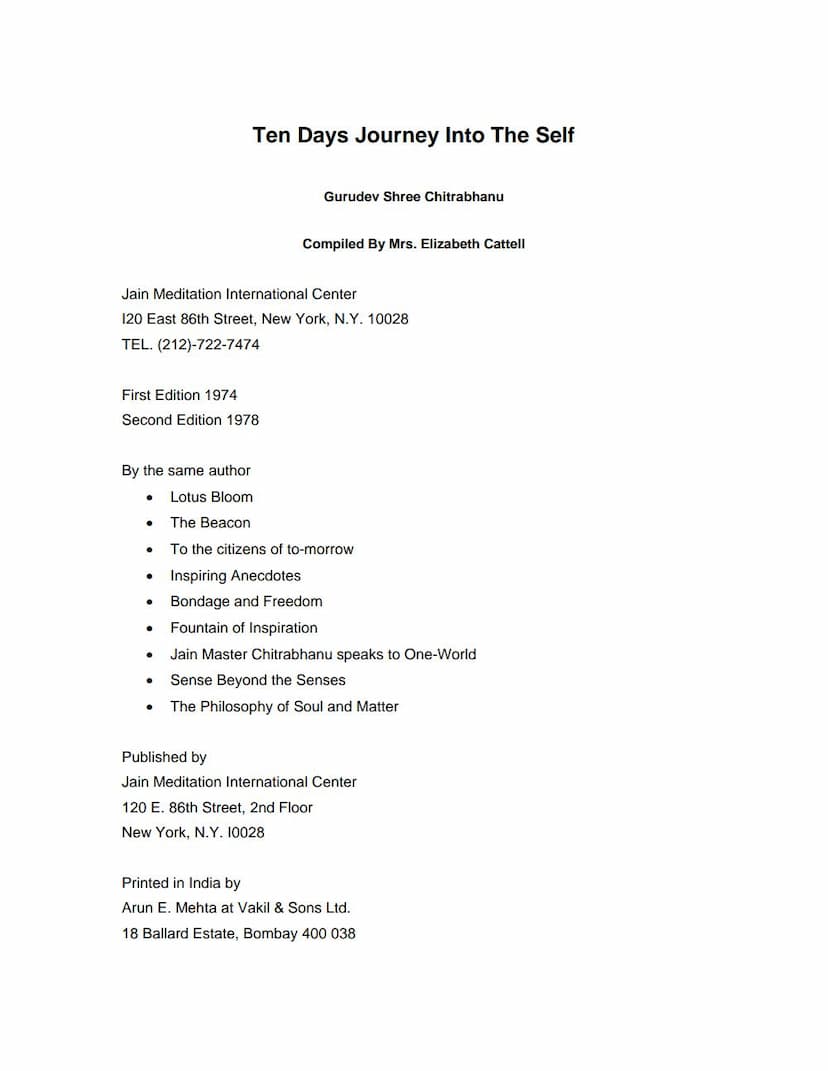Ten Days Journey Into The Self
Added to library: September 2, 2025

Summary
This comprehensive summary covers the essence of "Ten Days Journey Into The Self" by Gurudev Shree Chitrabhanu, drawing from the provided text excerpts:
Overall Theme: The book is a guide to self-discovery and spiritual growth through meditation, rooted in Jain philosophy and presented in a modern, accessible way. It emphasizes the inherent divinity within each person and advocates for a life of virtue, compassion, and harmonious action.
Author's Approach: Gurudev Shree Chitrabhanu, a Jain master, presents his teachings in a dynamic and experiential manner. The book is compiled from his writings and speeches by Elizabeth Cattell, highlighting the relevance of Jain principles to contemporary issues like global community, environmental concerns, and personal well-being.
Core Jain Principles Highlighted:
- Ahimsa (Non-violence): This is the foundational principle, emphasizing non-violence towards all living beings in thought, word, and deed.
- Aparigraha (Non-acquisition/Limited Consumption): In an age of overconsumption, this principle calls for restraint and responsible use of resources.
- Relativity: The understanding that truth is multifaceted and that open-mindedness to different perspectives is crucial.
- The Law of Karma: The understanding that actions have consequences, influencing our present and future.
- Divinity Within: The core belief that each individual possesses an inner divine spark that can be realized through spiritual practice.
The "Ten Days Journey" Structure: The book is structured around a ten-day journey, with each chapter focusing on a specific aspect of self-discovery through meditation, often linking it to essential virtues.
Key Concepts and Virtues Explored:
-
The Experience of Meditation:
- Meditation is presented not just as concentration but as a journey beyond the mind, words, and ego to connect with the true Self or spirit.
- The ego is seen as an outer shell that needs to be shed to reveal the inner brilliance.
- Meditation helps us discover our purpose and contribute to the world.
-
Four Essential Virtues:
- Amity (Goodwill): Wishing well for the entire universe, extending love and goodwill to all beings. It's about active contribution to planetary prosperity, not just wishing.
- Appreciation: Recognizing and valuing the potential, virtues, and efforts of others, especially those who embody higher human ideals. It also involves appreciating those closest to us and those whose labor supports our lives.
- Compassion: Feeling the pain of others and taking action to alleviate suffering. It calls for understanding the root causes of suffering (poverty, violence) and extending compassion even to those who cause harm, as well as to the aged and oneself.
- Equanimity: Maintaining inner peace and balance amidst life's chaos, challenges, and the resistance of others to our guidance. It involves patience, not demanding acceptance of our help, and learning from our own errors.
-
The Quality of Concord:
- This virtue emphasizes unity, harmony, and cooperation. It's about singing a "song of concord" that unites us to the universe and humanity, rather than national anthems that divide.
- Concord requires collaboration and recognizing our interdependence. It starts in the home and extends to all relationships.
-
Overcoming Inner Enemies:
- The mantra "Namo Arihantanam" (I bow before those who have conquered their inner enemies) guides this chapter.
- Inner enemies (fear, greed, ignorance, ego) need to be recognized and overcome through self-knowledge and conscious effort.
- This is a long process, requiring patience and self-faith, like nurturing a seed.
-
Meditation on Joy:
- True joy is an inner experience of being whole and united with the universe, not dependent on external circumstances or possessions.
- It's distinguished from fleeting pleasure, which is often ego-driven.
- Joy arises from living meaningfully, being creative, and giving to others.
-
Meditation on Energy:
- We are not possessors of energy; we are energy. This conscious energy is our true nature.
- Human energy, guided by love and intelligence, leads to evolution and blessings. Without awareness, it can be destructive.
- Effective communication is a vital outlet for this energy, and using words to reveal rather than conceal is key to spiritual growth.
-
Meditation on Creative Action:
- Divine energy within us should be channeled into creative action, making the human the foundation of the spiritual.
- Our actions shape our destiny, and now is the time for unfoldment and fulfillment.
- This involves integrating contemplation with action, purifying our essence, and directing our energy towards our life's mission.
-
Mahavir Jayanti:
- This chapter celebrates the birth of Bhagwan Mahavir, highlighting his life as an embodiment of truth, wisdom, and the principles of Ahimsa and Aparigraha.
- It emphasizes the timeless nature of truth and the importance of celebrating the teachings of all prophets.
- Mahavir's insights into the inherent divinity within humans, the pursuit of bliss, the importance of self-friendship, and freedom from inner enemies are presented as vital for modern life.
Overall Message and Call to Action: The book encourages readers to embark on their own inner journey through meditation, cultivating virtues like amity, appreciation, compassion, and equanimity. It stresses the importance of self-awareness, overcoming internal obstacles, and channeling our energy into positive, creative actions that contribute to the well-being of ourselves and the world. The ultimate goal is to realize our inner divinity and live a life of purpose, joy, and harmonious connection with all of existence.